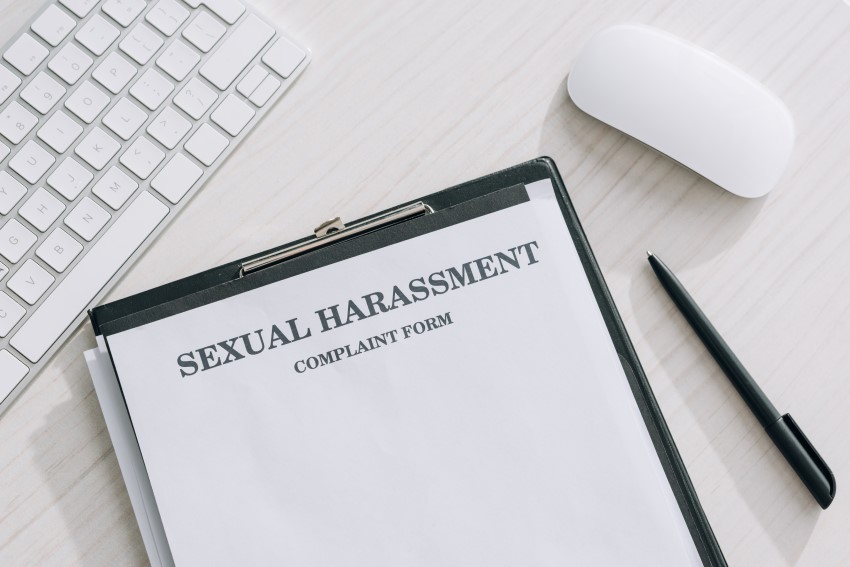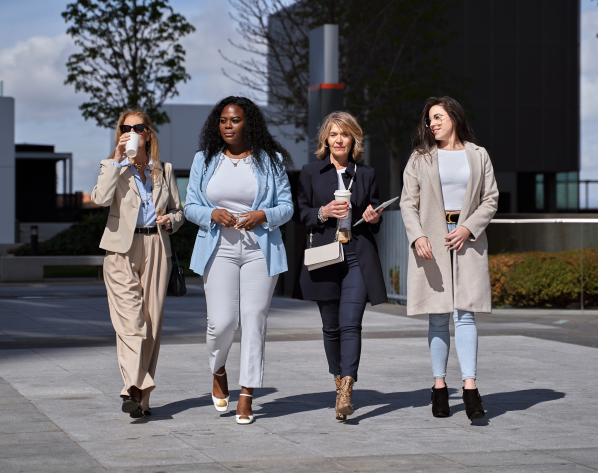How women lawyers are portrayed on TV and in the news

Listen to I Am The Law
Want to hear from lawyers about their practice? Check out our other podcast, I Am The Law, for dozens of in-depth interviews.
Columns
- Bloomberg Big Law Business: TV's Influence in the Perception of Women Lawyers by Swethaa Ballakrishnen, Researcher at NYU Abu Dhabi
- Above the Law: True Progress: Female Lawyers As Multi-Dimensional Characters In The Media by Rachell Purcell, Attorney in Atlanta
- Lawyerist: Women In The Law Podcast: "In the Media"
- Massachusetts Lawyers Weekly: Women in popular culture: dressing for success by Lucy Jewel, Law Professor at University of Tennessee
- Hire an Esquire: Women Lawyers in the Media by Cath Bore, Writer and Radio Presenter
- The Girl's Guide to Law School: In the Media: How Women Lawyers are Portrayed on TV and in the News by Gabriella Martin, Law Student at Quinnipiac University School of Law
Podcast guests
Roundtable guests
Moderators
Transcript
David Lat: Let's not mince words: The Litigatrix is a bitch. She didn't excel in litigation's testosterone-soaked precincts by playing nice. Like that other professional '-ix,' the dominatrix, the Litigatrix knows how to crack a whip. Making men feel pain is part of her job description.
Olympia Duhart: That's David Lat. He is founder of Above the Law, reading for us from his 2008 New York Observer piece about female litigators on TV. David coined the term "litigatrix" to reflect a certain type of woman lawyer. Litigatrix sexualizes a gender-neutral term – litigator – to show the power and dominance of a female litigator. Since David's first use of the term in 2008, it's been used in dozens of articles on Above the Law to describe both fictional and real life women litigators.
The Washington Post adopted David's description in a 2013 profile of White House Counsel Kathy Roommler. The Post called her a "superstar litigatrix." The newspaper followed up the next day with an article devoted entirely to her shoe collection.
Staci Zaretsky: Why do we need to know about her shoe collection? When are we gonna see a story about a male lawyer and his really cool belts?
Olympia Duhart: I'm Olympia Duhart, and I'm a professor at Nova Southeastern University's Shepard Broad College of Law. This is LST's mini-series about women in the law, where we discuss implicit bias, the leaky pipeline, and more. This week, we examine the ways in which women lawyers are treated in the media, track the evolution of women lawyers in pop culture and explore the impact of media representations of women lawyers.
It's no surprise that the women we talked to do not embrace the term litigatrix. Valerie Barnhart is a partner at a mid-size firm in Ft Lauderdale.
Valerie Barnhart: My take on that term is that it's offensive. It perpetuates, unfortunately, the stereotypes that are out there where a lot of times female attorneys are regarded by their appearance or certain other connotations rather than the quality of their intellect or their work.
Olympia Duhart: Virginia Hoptman, the appellate litigator we heard from in Hey Sweetie, also objected to the term.
Virginia Hoptman: It flips it around to something that sounds, I don't know, sexually dirty. There's something wrong with you, you're not true to your gender if you are as aggressive as your male counterparts are. It comes across as a criticism – almost even a moral criticism.
Olympia Duhart: So what was David Lat trying to convey?
David Lat: The jumping off point for the litigatrix essay in the Observer was a series of portrayals, all around the same time, of women litigators. There was Patty Hewes, Glenn Close's character in Damages. There was Tilda Swintin's portrayal of Karyn Crowder in Michael Crayton. So it was around this time that there were a lot of depictions of women litigators in the media. I detected this thread running through them of women who were very tough. I contrasted that with the earlier depiction of a woman lawyer that many, well some of us who are old enough to remember, might recall. Ally McBeal by Calista Flockhart. Ally McBeal was very different. She was girly, she was always questioning herself. She was a little bit flighty, And I was contrasting that depiction with the litigatrix portrayal.
I was trying to capture the essence of a strong confident powerful woman litigator who really takes no prisoners.
Olympia Duhart: Nevertheless, the sexual connotations connect quality lawyering to appearance.
David Lat: It all stems from the sensibility that Susan Sontag describes as camp, which is very common among my tribe, gay men. We tend to see the world from a very aesthetic sense. We look for and are attracted to artifice, exaggeration. And one of the things that Sontag talks about in her famous essay, Notes on Camp, is that what is most attractive to a Camp sensibility is what goes against the grain of one's sex in terms of traditional conceptions or stereotypes. So for a camp sensibility the things that are most attractive are beautiful men and masculine women. I've always been attracted to this notion of a woman lawyer who beats men at their own game.
David's colleague has stopped using the term.
Staci Zaretsky: My name is Staci Zaretsky and I am a writer and editor for Above the Law.
When I first started at Above the Law, I did use that term. In the six years that I've been working, I don't like to use that term anymore. Women do not need to have a separate special title.
Olympia Duhart: This fits the broader trend of packaging accomplished women as novelties. The Washington Post's coverage of Kathy Ruemmler stressed her fashion style instead of her professional accomplishments.
Staci Zaretsky: I think one of the worst things in the world that can be done when covering women who are lawyers of any kind, is to talk about what makes them feminine. Good, you have nice shoes so what. Having great shoes has nothing to do with your skills and your competency as a lawyer.
Olympia Duhart: Staci was more impressed with the way the New York Times Dealbook column approached a piece on a high profile female attorney. In July 2016, Michael de la Merced wrote for the Times about Faiza Saeed, the first woman to preside over Cravath, Swaine, & Moore, one of the oldest and most prestigious law firms in the country.
Staci Zaretsky: That article was all about the amazing things she's done in her career.
Olympia Duhart: The Dealbook story got it right. But stories meant to highlight achievement routinely manage to partially undermine their own message. Consider, for example, stories about a group of women managing partners and practice group leaders who meet every month in New York.
Staci Zaretsky: A lot of publications refer to this group as a sorority. I do not like that classification. And I was in a sorority myself. Are all the males leaders of firms sometimes go to lunch with each other? Are they being called for fraternity? No they're not. Yes, they are in a sisterhood because it's a very small group of women who have ascended to these high-level positions in firms, but they don't need to be downgraded to a term like sorority.
Olympia Duhart: Ric Sheffield explains why this media treatment is so pernicious.
Ric Sheffield: My name is Ric Sheffield, and I am a professor at Kenyon College, teaching and directing the law and society program.
It de-professionalizes women who become attorneys and judges so that is says it really is a social endeavor as opposed to a professional endeavor.
Olympia Duhart: Not even the women on the Supreme Court are immune. In 2015, the National Law Journal ran a story in entitled, "Kagan Dishes on Supreme Court Bar, State of the Union and Law Schools." Here, Justice Kagan is said to "dish" on important matters. Would the same media outlet describe an interview with Chief Justice John Roberts as a dish session?
Portrayals in pop culture can be worse at times. But let's start with one of the earliest representations of women lawyers on screen, Mary Bancroft, in the 1930s crime drama Scarlet Pages.
Ric Sheffield: Women lawyers, of course, were anomalies both in real life but also in pop culture. ‘Scarlet Pages' was one of those first productions that appeared in 1930 and it was a sort of quintessential, we'll make reference to this aberration -- this woman lawyer -- this lady lawyer who is doing something but not really much that was lawyer like. The early depictions really did not focus on what women did as professionals. They simply wanted to use the uniqueness, or the strangeness of a woman who held or occupied a position as a lawyer. But we don't really want to talk about whether or not she is a good lawyer or what she does as a lawyer, we just want to reference the fact that she was a lawyer. That began the trend and became the practice. There was very little focus on women as competent professionals until much later.
Olympia Duhart: In a law review article about women lawyers in pop culture, Ric wrote about how domestic conflict interrupted Mary Bancroft's professional life. Rick says thateven 80 years later, not much has changed for women lawyers on screen.
Ric Sheffield: One of the most popular programs right now on television is ‘The Good Wife'. This fictional lawyer Alicia Florreck is a classic example. Women lawyers in film and television have in fact come a long way, there is a great deal more emphasis upon their professional competence. But what hasn't changed all that much is the depiction of women lawyers in this domestic arena. That it is really quite clear that the story remains that you can't have it all. If you are going to be a successful woman lawyer, you must be willing to sacrifice your private and personal life.
Olympia Duhart: tries to help his students understand what real life lawyers do.
Ric Sheffield: Students invariably would come to a class where we are talking about the impact of law, and these students seemed to have a great deal of knowledge and information. And I was sort of struck by that because I knew as students who were 19 to 22 years old, they had never gone to law school yet and they had never practiced law. Yet they felt as though they had an acute understanding of the way law worked. And it became quite clear to me in the late 1980's that the source of their information was popular culture. They do not know Ruth Bader Ginsburg. They do not know Elana Kagan. They do not know Sonya Sotomayor. But they do know Olivia Pope from Scandal. They do know Alicia Florrick from ‘The Good Wife'.
Olympia Duhart: Here he's not criticizing his students, but pointing out how gaps in knowledge are filled. For many young lawyers, pop culture might be all they know.
Joy Diaz Graf: My name is Joy Diaz Graf. I work for the federal government. Growing up, I didn't really know any attorneys or anyone that had been to law school.
I got the impression that in order for women to be effective attorneys they come off a lot harsher than the men. They can't ever be soft or empathetic or anything like that. They have to be so much more demanding and this is how it's going to be and this is what I want.
Olympia Duhart: Two shows Joy watched growing up were LA Law and Law & Order. Even several decades after airing, these shows have a lasting impact on how women lawyers see themselves. But women are not a monolithic group. On-screen portrayals affect viewers in all sorts of ways. Take Pamela Falk.
Pamela Falk: This is Pamela Falk. I'm based at the United Nations as a UN resident correspondent and a foreign affairs analyst for CBS News.
I have a different take; television has a history of portraying woman and woman attorneys as tough cookies, I think that they have done a fairly good job in Law and Order, it's the district attorney, and Boston Legal, Shirley Schmidt, Claire Huxtable in the Cosby Show, even Ally McBeal. Obviously, there are different things that they portray in each of these different TV shows, but they're woman who have a profession, they're woman who have their identities, and they're woman who can fend for themselves. So, I actually don't think it's been poorly portrayed, I think if anything, woman look to them for guidance, how they dress, what kind of clothes, there's even a website that would tell you what Juliana Margoles and The Good Wife wore so that you can buy it for court the next day. And I will admit that I've gone to the website and bought the suit. And I didn't look like her but I at least thought it was a good professional look.
Olympia Duhart: After the break, we talk to a Hollywood screenwriter about her popular TV show. But first, our team at Law School Transparency wants to give a special thank you to Elon University School of Law in Greensboro, NC for hosting a roundtable about women lawyers in the media. At Elon, executive producer Kyle McEntee and I moderate a discussion that you can listen to however you're listening right now. You can also visit LST Radio dot com to read transcripts, guest bios, and get a sneak peak at what's to come.
Luke Bierman: I'm Luke Bierman, the dean of Elon University School of Law. Support for this podcast is provided by Elon Law, the preeminent school for engaged and experiential learning in law. Elon law offers transformational professional preparation with the only full-time residency in practice for academic credit. Learn more at law.elon.edu.
Olympia Duhart: We talked to Swethaa Ballakrishnen, a post-doc at NYU Abu Dhabi and a research fellow at the center for the legal profession at Harvard Law School. She told us about the risks and rewards of on-screen portrayals.
Swethaa Ballakrishnen: It's a very useful tool to enlighten the public. That's why it's a great socializer, but it also can be used to deeply alienate people and deeply fix preconceived Ally McBeal is the classic example. If you remember the early seasons, the focus was really on her being this highly educated lawyer that was dealing with personal crisis constantly. But when she was in court, she was always clumsy, she was always all over the place, she never had her thoughts together, and it was always the climax that changed the way she pulled her thoughts together and won a case.
It makes for great drama, don't get me wrong, I watch it, it's a lot of fun, but it sets up what we know to be true about women. Like the stereotype that you actually respond negatively to external threats, that in pressure situations you're likely to choke.
The problem with that is the bits that are really unrealistic nobody will remember as unrealistic, but the subtle bits that could be realistic like that a woman is clumsy, that will get remembered. The fact that she's clumsy reinforces what you think of women. Society has already told you women are wonderful in nonprofessional contexts but not at work. So that stuff gets reinforced even if you're not actively taking that in from the episode, but the other stuff doesn't.
Olympia Duhart: On the other hand, missteps makes characters more relatable. Kerry Washington plays attorney Olivia Pope on Scandal. Here's Joy Diaz Graf again.
Joy Diaz Graf: She does cry, she has a weird relationship with her father and her coworkers. She's tough, but she also has different sides that you can kind of see, and she still can be effective at her job.
Olympia Duhart: So does Joy emulate Olivia Pope at work?
Joy Diaz Graf: I try! I don't know if I'm succeeding, but my boss did tell me he is proud of me because I am becoming more assertive and less worried about what people think about. It's one of my personality traits that could use a little tweaking because not everybody's going to like me. Not everybody should like me all the time.
Olympia Duhart: Swethaa, the sociologist, says the media representations can be empowering. But she notes that there are risks to portrayals, especially for women in historically marginalized groups.
Swethaa Ballakrishnen: This camaraderie and the empathy that comes with having the portrayal of someone like you on screen. It mobilizes, it makes you more visible than you might have been if you weren't on it. So Madmen having a really strong woman changed the way we think about woman in the work place in a certain era, like the Good Wife changes how we think of a single mother going back to the workforce. But at the same time there's this strong sense of alienation for anybody that doesn't fit that role on the face of it: women of color, women that are queer, women that don't identify exactly like the middle class white woman who is against all odds making this mark in the workplace.
Olympia Duhart: Why such fuss about how women are portrayed on a television or movie screen? People must recognize that writers take dramatic license to engage the audience. Maybe it's just entertainment?
Swethaa Ballakrishnen: The most harmful are the things that don't seem harmful because then you think it's just fun and games. When something is explicitly racist or gendered, on the face of it just deeply problematic, we know how to mobilize to push back against it. The problem with implicit biases that get primed and reinforced is that you just think oh come on you can't take that that seriously. Does everything have to be politically correct? That was just one time, he was just making fun. Do you have to be a feminist about everything? This sort of rhetoric, that's the real problem because then you feel like you're this extreme case scenario for constantly being an angry feminist when in fact what it's doing is normalizing that disparity. That's the problem with fun and games.
Of all the things that I think reinforce these gender stereotypes, I don't think legal professionals have it the worst at all. I actually think crime shows do worse things to race than legal show do to gender. So in the larger scheme of things, this is not the biggest violence that exists, but let's not forget that no matter what it is media is a strong socializer. It still gives people meanings and ideas and logic, and that has a gravity of its own and we need to be aware of it.
Olympia Duhart: So how do screenwriters approach writing about lawyers? To find out we talked to someone in the industry.
Erika Green Swafford: My name is Erika Green Swafford and I am a writer on How To Get Away With Murder.
Olympia Duhart: How To Get Away With Murder is Shonda Rhimes's latest success and airs Thursdays on ABC. The show stars Viola Davis as Annalise Keating, a law professor and criminal defense attorney. The show consistently earns high ratings and reviews. Erika, an award-winning writer for the show, is not a lawyer. But she says that there are a number of legal minds informing character and plot development.
Erika Green Swafford: There are a couple of lapsed lawyers in the room. W eare looking up the ways that it actually happens in the real world. Our researchers are telling us "this is the way it is actually supposed to be happening". We have a defense lawyer that helps us as a consultant on the show. And then that researcher does reach out to a wide variety of legal minds and institutions and agencies to get the real information. We might go "wouldn't it be cool if we can do X? Can we do X? Is that legal? Is that something that happens?" The lawyers in the room are like "ehhh it sounds like it could be something that might be able to happen. We need to do a little more research. The researcher gets on it, talks to the actual people and says "Yo, we want to do this what do you think?". So, there's a great feedback loop that happens so that even though we're within a heightened reality we are trying to get some of the legality right. I know I get e-mails from friends and my dad who also happens to be a lawyer and he's like "That can't happen but ok I'm going to let that slide because this is a television show." We do take some dramatic license on things but we do like to get a lot of it right.
Olympia Duhart: On the show's own website, Annalise is described as "brilliant, charismatic and seductive." Her skill in the courtroom is matched by her propensity to push the ethical envelope.
Erika Green Swafford: Pete Nowalk created a quixotic, mercurial, twisty, really smart, damn good at their job character that draws you in as much as some of the choices that she makes repels. She will make the choice that maybe one of us would only dare to make. I think that's what draws people to her every week. I have a lot of people who love the bravado -- the fact that she is smart, whip smart, the fact that she is flawed like any other human being. As the seasons have been moving on people love to unfurl even further the reasons behind all of that. So, it's not that she's sort of this mysterious character and you don't understand why she's making certain choices.
Olympia Duhart: There are inherent dangers when you show a black woman crossing ethical lines week after week. After all, media is a forceful socializer. On the other hand, it's not exactly fair to anoint Annaliese Keating the surrogate for all black female attorneys.
Erika Green Swafford: She doesn't represent every black female attorney. She represents Annalise Keating. It's exiting that you get to see somebody in a darker range. This is new and different because we never get to see a character get to do these things. Sure, within our particular universe in terms of the world that we live in today, she can be seen as being morally bankrupt. I don't necessarily think you can judge her as being morally bankrupt when you are working on the show.
Olympia Duhart: Despite her flaws, many viewers identify with her authenticity and complexity.
Many of the most powerful moments in the show take place outside of the courtroom or law school. Everyone took notice when Viola Davis took off Annaliese's wig and make-up to show her vulnerability in a delicate scene with her husband.
Erika Green Swafford: She was like "but I, as a person, would not just wear a wig at home all the time. Nobody necessarily really does that, so I want to show what happens when she has to take off the wig" and we made it a moment in the series to show her vulnerability. She was taking off armor that she uses outside to actually put on armor inside her home. She was being her whole self inside that house without that wig.
Olympia Duhart: Another compelling scene was when her mother Ophelpia, played by the iconic Cicely Tyson, combs her grown daughter's hair. The scene made Annaliese – normally an imposing attorney – immediately accessible. Many black women identify with the moment. And it took me back to sitting on the floor as my Aunt Lessie combed my hair. Erika had similar memories.
Erika Green Swafford: That was actually from my own experience. I remember quite well sitting between my mother's legs and her scratching up my scalp and us discussing issues of the day. Those are those real moments that a women like an Annalise can have -- especially since she's an African American woman. These are real African American female experiences and we want to make sure that people see that we don't wake up dewy with flawless hair. No-one wakes up dewy with flawless hair. People wake up with bed head and whatever. When you make those revelations and show those vulnerabilities it actually draws you more into the character. You, number 1, can either completely identify because that is your lived experience or you also can go "oh, I've never seen something like that but now I completely understand why that may happen and even though I don't have a similar experience, I completely get what they're trying to say with this particular scene. Then I therefore am more invested in this character and in this story as a result."
Olympia Duhart: Women lawyers on-screen have made important strides. Over time these portrayals have become more complex and nuanced. And continuing to make these strides is important for achieving equality in the workplace. After all, the media makes its mark on both self-image and societal expectations.
Explore episodes
Hey Sweetie!
Sexism in the legal workplace
In the Media
How women lawyers are portrayed on TV and in the news
Leaky Pipeline #1
Examining the premise of a leaky pipeline
Leaky Pipeline #2
From hiring to retention to leadership
Multiple Identities
Intersectional challenges in the legal profession
Solutions
Rules, sanctions, and awareness
Listen on
Distribution partners
In addition to traditional podcast channels, the series will enjoy wide distribution through a growing number of partners. Each partner will publish at least one article per theme. Across a wide variety of networks we will foster a lively discussion over the show's eight-week run.
We hope to empower both women and men to recognize and constructively address a wide range of workplace issues that negatively impact women, the organizations and firms they work for, the clients they represent, and the society we all live in.






